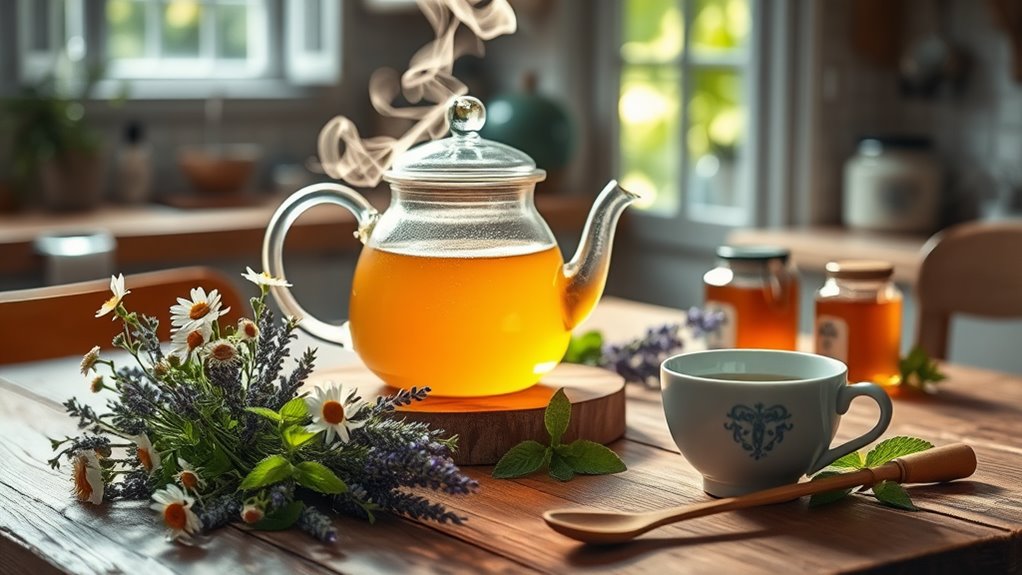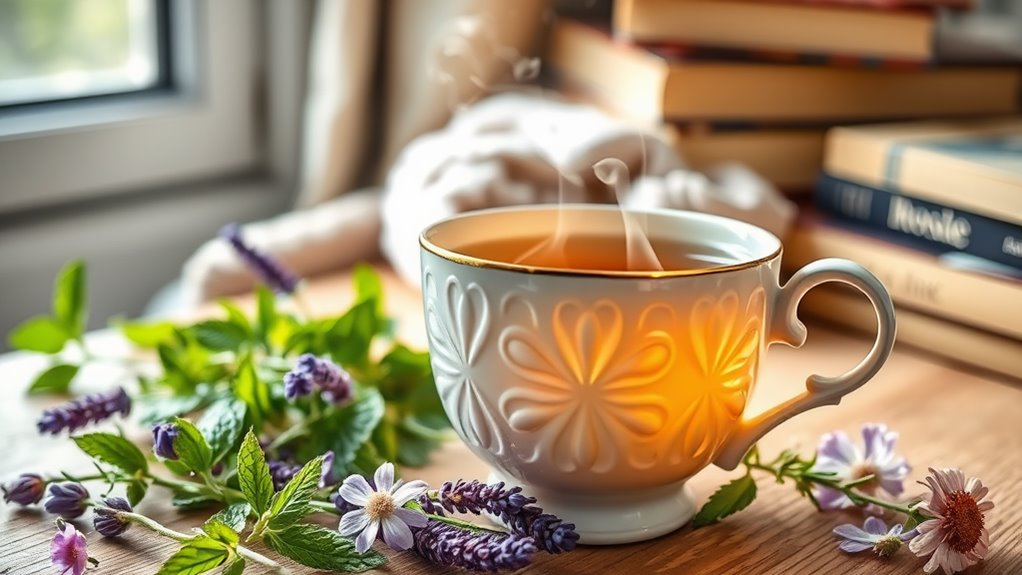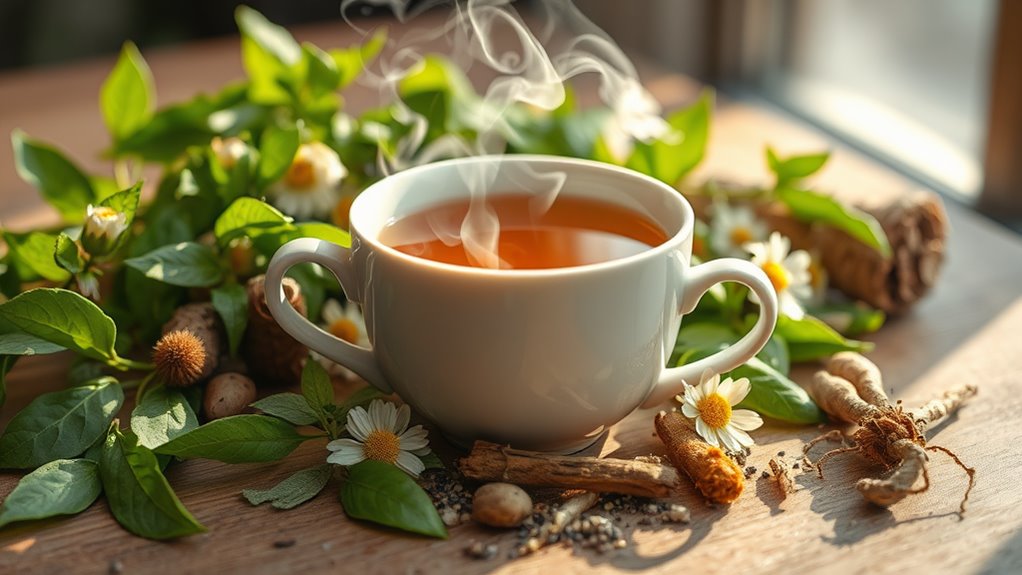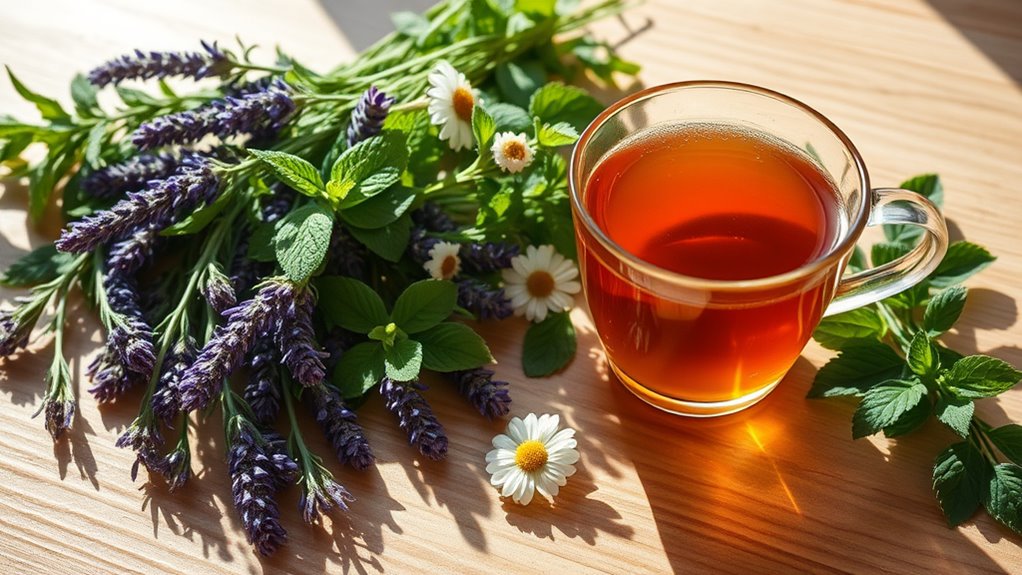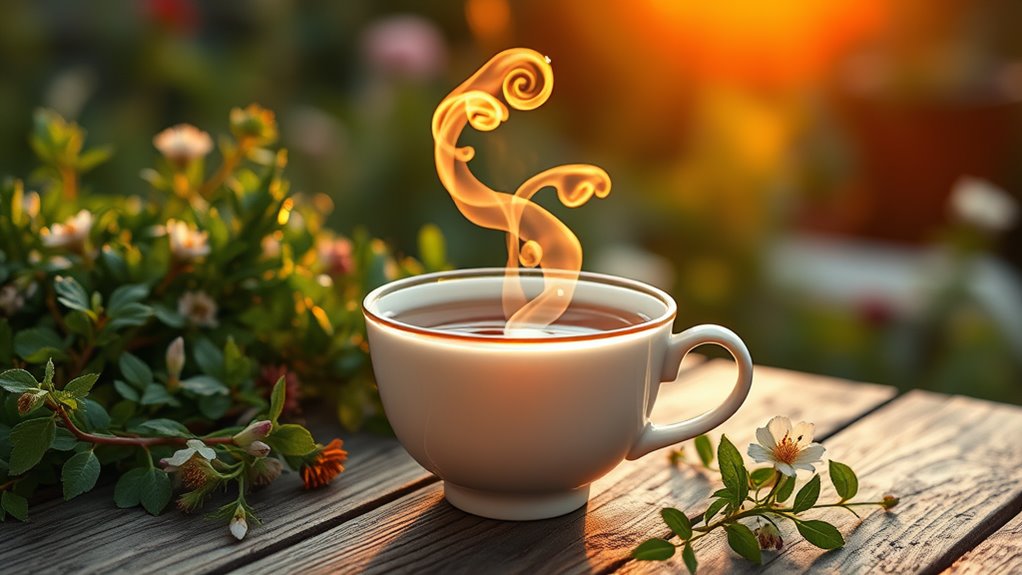How to Make a Herbal Sleep Tea That Actually Works
Imagine cradling a warm cup of herbal sleep tea, its steam curling like a gentle embrace around you. This soothing blend can transform your nighttime routine into a calming ritual that encourages restful sleep. By choosing the right ingredients and brewing techniques, you can unlock the natural potential of herbs. Discover how to craft this comforting beverage and enhance your journey to tranquility, one sip at a time.
Key Takeaways
- Choose calming herbs like chamomile, lavender, and valerian root, known for their relaxing properties to promote restful sleep.
- Follow a simple recipe: boil water, steep herbs for 10 minutes, and strain for the best flavor and benefits.
- Use high-quality, organic ingredients to ensure maximum potency and effectiveness in your herbal sleep tea.
- Steep the tea at around 200°F for optimal extraction, and avoid over-steeping to prevent bitterness.
- Enhance your nighttime routine with relaxation techniques like deep breathing, gentle yoga, or journaling alongside your tea.
Understanding the Benefits of Herbal Sleep Tea
Have you ever wondered how a warm cup of herbal sleep tea can transform your nighttime routine?
This soothing brew doesn’t just taste good; it supports relaxation and helps signal your body that it’s time to wind down.
By incorporating a simple sleep tea recipe into your evening, you create a calming ritual that prepares your mind for rest.
The act of sipping a warm drink encourages mindfulness, while the right blend of herbs can ease tension and promote a sense of peace. Additionally, many herbal teas are rich in calming effects, which can further enhance your sleep quality.
You’ll find that a nightly cup becomes a cherished moment, enhancing your overall sleep experience.
Key Ingredients for a Restful Sleep
To enhance your nightly ritual with herbal sleep tea, it’s important to understand the key ingredients that promote restful sleep.
Chamomile is a classic choice, known for its calming properties. Lavender adds a soothing aroma that helps reduce anxiety. Valerian root, though strong, is effective in inducing sleepiness. Lemon balm offers a gentle relaxation, while passionflower enhances tranquility.
Each of these herbs works synergistically to calm your mind and prepare your body for rest. Additionally, many of these herbs have been shown to provide stress relief, which can further contribute to a better night’s sleep.
Incorporating these ingredients into your tea not only enhances flavor but also creates a holistic blend that nurtures a peaceful night’s sleep.
Step-by-Step Recipe for Herbal Sleep Tea
Creating your own herbal sleep tea is a simple yet rewarding process that can transform your bedtime routine. Start by boiling two cups of water. Once boiling, remove it from heat and add one teaspoon each of dried chamomile, valerian root, and passionflower. Let the mixture steep for 10 minutes, allowing the soothing aromas to fill your space. Herbal teas, particularly those with soothing properties, can greatly enhance your relaxation before sleep. Strain the herbs using a fine mesh sieve or tea infuser. For added flavor, stir in a teaspoon of honey or a splash of lemon. Enjoy your warm cup of herbal sleep tea, and let the calming effects gently guide you into restful slumber.
Tips for Brewing the Perfect Cup
To brew the perfect cup of herbal sleep tea, start with quality ingredients that resonate with your taste and health needs. Pay attention to brewing time, as it can significantly influence the flavor and potency of your tea. Lastly, using the right water temperature helps to unlock the full benefits of the herbs, ensuring a soothing experience. Consider incorporating herbal teas known for their calming properties, as they can enhance relaxation and promote a restful night’s sleep.
Choosing Quality Ingredients
Selecting high-quality ingredients is crucial for crafting the perfect herbal sleep tea. Fresh herbs and organic sources enhance flavor and therapeutic benefits, ensuring you get the most restful sleep. Pay attention to sourcing and consider these essential herbs:
| Herb | Benefits |
|---|---|
| Chamomile | Calming, aids digestion |
| Lavender | Reduces anxiety, promotes relaxation |
| Valerian Root | Improves sleep quality |
| Lemon Balm | Eases stress, supports tranquility |
Always check for freshness and aroma, as these factors greatly influence the tea’s effectiveness. Prioritize organic options to avoid pesticides and additives. Enjoy the process of selecting your ingredients!
Brewing Time Matters
How long should you steep your herbal sleep tea to unlock its full potential? Generally, aim for 5 to 10 minutes.
This time frame allows the herbs to release their soothing properties, creating a calming infusion.
If you steep for too short a time, you might miss out on the tea’s beneficial compounds, while over-steeping can lead to bitterness.
Keep an eye on the clock and taste as you go; adjusting the steeping time can help you find your perfect balance.
Proper Water Temperature
Achieving the perfect cup of herbal sleep tea isn’t just about steeping time; the water temperature plays a significant role too.
Start by heating your water to around 200°F (93°C) for most herbal blends.
This temperature extracts the beneficial compounds without burning the delicate leaves.
If you’re using more delicate herbs like chamomile, aim for 190°F (88°C) to preserve their flavor and aroma.
Remember, too hot can lead to bitterness, while too cool might under-extract essential oils.
Once you’ve got your water temperature just right, pour it over the herbs and let nature work its magic for a restful night’s sleep.
Enhancing Your Sleep Routine With Herbal Tea
Have you ever considered how a soothing cup of herbal tea can transform your bedtime routine?
Incorporating herbal tea into your evenings creates a peaceful ritual that signals your body it’s time to unwind.
Choose calming herbs like chamomile, valerian root, or lavender to promote relaxation and ease anxiety. Drinking calming anxiety tea can further enhance this soothing experience.
As you sip your tea, allow the warmth to envelop you, inviting tranquility.
Pair this moment with dim lighting and soft music for an immersive experience.
Over time, this simple addition can help establish a consistent sleep pattern, making it easier to drift off into a restful slumber each night.
Additional Relaxation Techniques to Pair With Sleep Tea
While sipping your herbal sleep tea, consider incorporating additional relaxation techniques to deepen your sense of calm.
Try practicing deep breathing exercises; inhaling slowly through your nose and exhaling through your mouth can lower your heart rate.
Gentle yoga stretches can also release tension, promoting relaxation before bedtime.
Create a peaceful atmosphere by dimming the lights and playing soft music or nature sounds.
You might find journaling beneficial, jotting down thoughts to clear your mind.
Lastly, consider visualization techniques, imagining a serene landscape, allowing your mind to drift as your body unwinds.
These practices enhance the soothing effects of your tea, as mindfulness techniques can help cultivate a deeper sense of tranquility.

